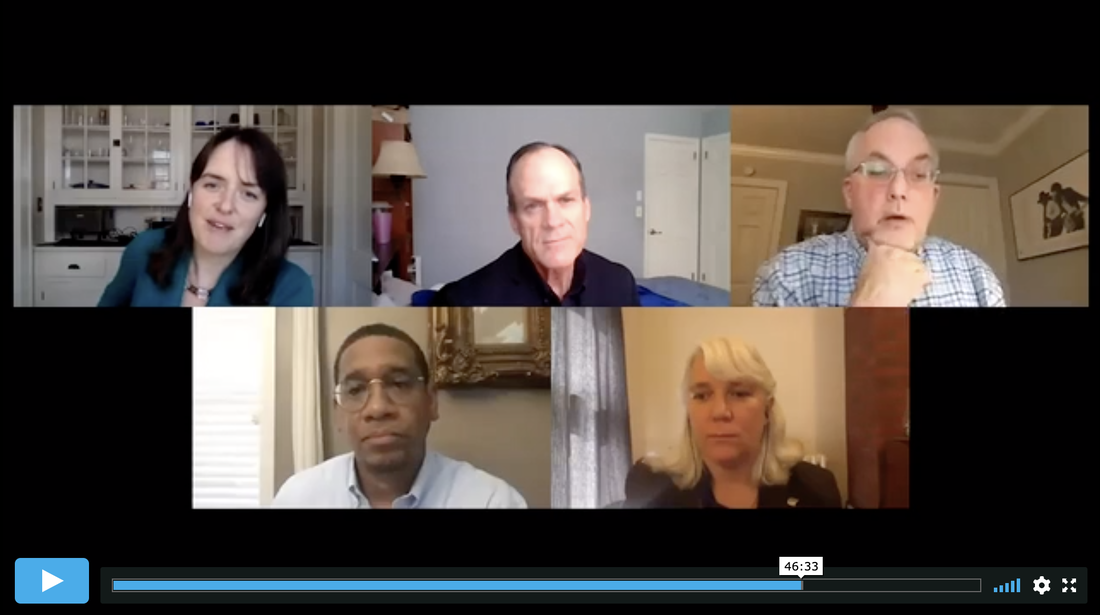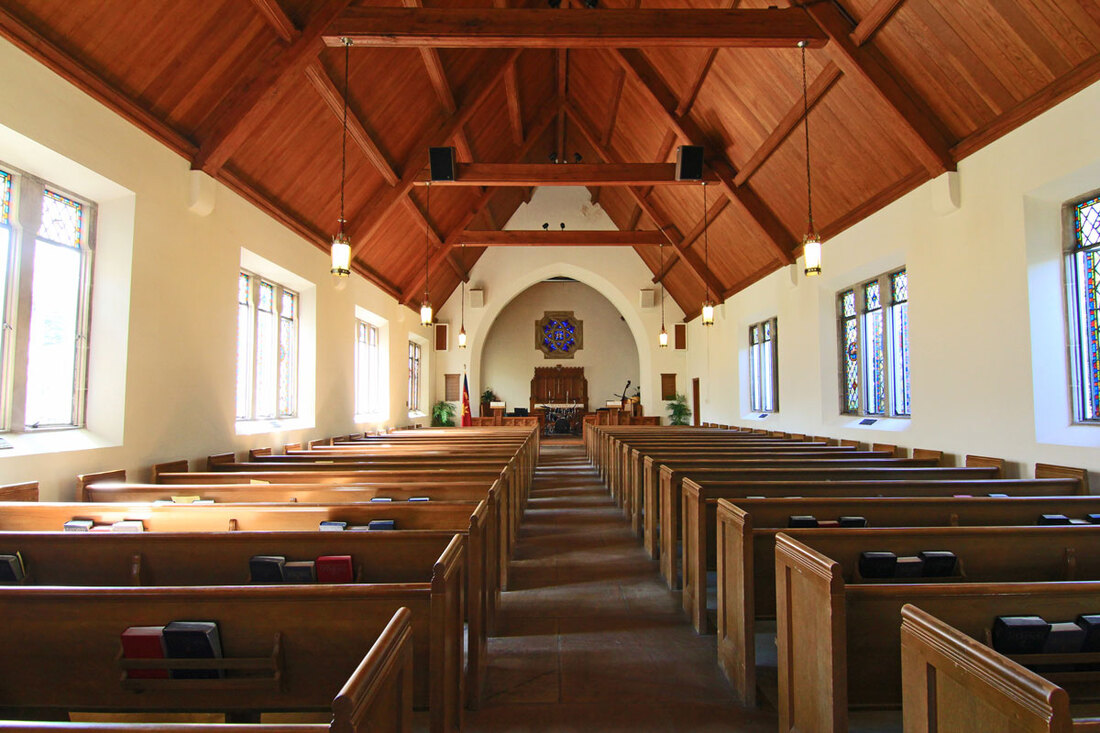|
The experience of joy can be especially challenging in times of adversity. As we experience loss and grief, we may struggle to see or even be willing to accept moments of joy as they appear. For example, how often have you felt a twinge of guilt after finding yourself spontaneously laughing when recalling a happier time with a loved one who has died? And yet, you may have also found that laughter, too, reminded you of what meant the most to you. These glimpses of joy – and, of course, joy does not only involve laughter – invite us into the complexities of life. How even in our most tragic moments, we can experience goodness and warmth, too. In recalling multiple disaster events, the Revs. Kime, Crebbin, Swain, and Gardner speak of these complexities and nuanced interfaces here at the 46:33 mark. You may also find this book on Joy, edited by Christian Wiman, meaningful in this season of conducting “safer at home” practices. In the introduction, Wiman speaks eloquently to how experiences of loss and elusiveness interplay with perceptions of joy. As much as we might prefer them to be distinct from one another, nevertheless, they often call one another to mind and heart. How are you finding yourself surprised by joy, or missing joy, in these days? Are you finding joy appearing throughout your experiences of the phases of disaster, or are you finding its absence complicating your experience? What is sustaining you as you move through these days? As a leader of your organization, your ability to find moments of refreshment along the way will help you manage the multiple ups and downs and lead your community well. Share below what you are doing to maintain your health and encourage those around you. Rev. Dr. Kate Wiebe serves as the Executive Director of ICTG. She is an organizational health consultant and pastoral psychotherapist. She lives with her family in Santa Barbara, CA.
1 Comment
In this series we acknowledge that "disasters do not wait until we are fully prepared", that many leaders are learning as they go, and we extend our hope that though sharing perspectives you may find some easier ways to create a new rhythm at this time. Read What’s Working For Me Right Now - Part 1 here. When I was younger in ministry, many years ago now, I remember talking to another pastor who had just returned from a sabbatical. I had never had a sabbatical so I was curious to hear what he learned. Without hesitating, he said, “I found out what kind of a Christian I was outside of my identity as a pastor.” Those words were a game-changer for me in how I assessed my own identity. I am a professional Bible studier, prayer, leader, teacher, shepherd and a whole lot more but without the role of pastor who would I be as a person, a child of God? The role of a pastor is to shepherd, guide and be with one’s people, in the same physical space. What happens when that is taken away? In the middle of this unprecedented pandemic, we are finding out. California was the first state to adopt “shelter-in-home” standards. When the order was given my home became my “permanent” office. Previously, working from home, was a nice little change in the weekly routine. Now, it is the routine. Presently I feel I am asking the question again, but for a very different reason, “Without the role of pastor, with one’s people, who would I be?” To get at this I want to share a shortlist of what is working for me, at the moment (Check back with me in a few days or weeks!):
In the midst of all the turbulence and unprecedented circumstances may you find what works for you. May it bring you strength, wisdom and peace to walk forward as you care for yourself, your family and your people. Further Reading: On Sleep: Mukherjee, S., Patel, S. R., Kales, S. N., Ayas, N. T., Strohl, K. P., Gozal, D., & Malhotra, A. (2015). American Journal of Respiratory and Critical Care Medicine, 191(12), 1450–1458. doi: 10.1164/rccm.201504-0767st https://www.atsjournals.org/doi/pdf/10.1164/rccm.201504-0767ST On Positive Consequences: Updegraff, J. (2008). Searching for and finding meaning in collective trauma: results from a national longitudinal study of the 9/11 terrorist attacks. Journal of Personality and Social Psychology, 95(3), 709–722.
This video outlines 4 simple embodied coping practices, which may be useful to manage anxiety and panic during social isolation, lockdown, quarantine, and response to the COVID-19 disaster. You can watch the whole video or forward to a particular practice.
The presenter is the Rev. Dr. Storm Swain, the Frederick Houk Borsch Associate Professor of Anglican Studies, Pastoral Care, and Theology at the United Lutheran Seminary, and author of 'Trauma and Transformation at Ground Zero: A Pastoral Theology,' Fortress, 2011.
Resource Overview:
Watch the whole video above, or use these timestamps to skip to a particular practice. Instinctual Response in a time of Crisis or Disaster- Skip to this section 0:25
Embodied Coping Practices- Skip to this section 2:49
Read more from Rev. Dr. Storm Swain here.
In the coming weeks, pastoral care needs will escalate exponentially as COVID-19 impacts continue to increase. Here are some ways your ministry team can prepare:
Creating a Trajectory Map
Use the Phases of Disaster as a starting place, and begin to draft a trajectory map for your organization or community. You can share your maps on twitter, facebook, instagram, or linked in, using hashtag #carerestores. As you're creating your map, consider the differences your organization or community are experiencing compared with traditional understandings of episodic or singular incident disasters. For example, many groups are finding their sense of the initial "hero" stage has been a far sharper incline or spike, as leaders and volunteers have rushed in this last week to solve as much as they can and now, even within just a week or two, are experiencing significant senses of fatigue. The fatigue appears to be related to a combination of the strong push to help along with the remarkable speed at which new information is released, often changing and becoming out-dated even hour by hour. Continue to use your map as a draft or living document with your team, a template that you can update over the coming weeks and months. Recognize the Range of Impact Over the next several weeks and months, your congregants, ministry recipients, or community members, will experience a range of impacts. Some of these will be directly COVID-19 related. For example:
Some of the impacts will be indirectly related to COVID-19. For example:
Pacing Care for Sustainability As you consider what needs already are present and what may be coming, in what ways can you and your staff pace and nourish yourselves now so that you can avoid burnout and provide sustainable care through the long-term?
Here are some helpful resources for understanding trauma, pacing, and sustaining long-term care:
In-depth Training Manuals: General Ministry Training Manual Youth Ministry Training Manual Spiritual Direction Training Manual Download Free Network Inventories: Spiritual Care Network Inventory - Congregational Spiritual Care Network Inventory - Personal Youth Leaders' Care Network Inventory - Congregational Youth Leaders' Spiritual Care Network Inventory - Personal Further Reading: Congregational Care During COVID-19 Ministry in the Time of Public Health Crisis COVID19 Becoming a Companion along the Valley of the Shadow of Death How Long Term Response to Pandemic Differs from Other Types of Disaster Response Metabolizing Adversity
At the Institute, we have a phrase we use in times of collective trauma response: disaster is your business now. It's a mantra that helps us and our service recipients bring to mind the new reality that now is not business as usual.
Even so, all of that is easier said that done. It's difficult to fully take in all that any disaster means, let alone what the ramifications will be of a global pandemic.
In terms of congregational care, here are some important things to consider is you focus on the primary business of response to COVID-19. Mental, Emotional, and Spiritual Health The longer quarantines last, the less people are infected or die, but the more behavioral health challenges may arise related to people being cooped up in their homes, having limited touch, and having lost significant income or jobs. The shorter quarantines last, the more people are infected or die. This presents additional behavioral health challenges related to grief and bereavement, especially if people are unable to visit their loved ones in times of distress or death, as well as challenges related to conducting memorial services under these circumstances. What you can do to prepare: Continue to keep your staff and self informed about the trajectory of the virus in your community. Maintain an up-to-date referral list of behavioral health providers in your community to refer your congregants to as needed.
Worship and Care
Depending on the trajectory of the virus in your community, your congregation may need to provide worship and pastoral and peer care services remotely for many weeks or months. Your staff and volunteers also may need to provide ongoing volunteer services to assist more persons in your congregation or community who are unable to access basic necessities, including groceries, assistance with utilities maintained online, banking, and so forth. What you can do to prepare: Continue to keep your staff and self informed about the trajectory of the virus in your community. Also stay informed about what services your greater community is providing that your congregants can access as needed, or how your congregation can assist your greater community in meeting needs. Consider ways you can help your healthy volunteer base pace themselves for the long term. Encourage volunteers and staff to take regular breaks and not over-function, in order to be available for the duration and avoid inadvertent burnout. If you are part of a smaller congregation, consider partnering with a larger congregation in your area that can assist with remote worship and care services. Financial Support Your congregants, your community, and your congregation likely will experience financial challenges in the weeks and months ahead. These may include loss of jobs, loss of businesses, significantly reduced investments, reduced donations, and so forth. What you can do to prepare: Continue to keep your staff and self informed about the trajectory of the virus in your community. Consider whether there are important, and frank, conversations that may need to be had with your governing body about the reality of your congregation's financial state before the virus and what it may experience with loss of income. Recognize the fact that you may have to pace not only yourselves but what you focus on in the weeks ahead to ensure stability, if you are able. If your congregation is not facing significant financial risk, consider the ways you may prepare to assist or even lead your community in providing financial assistance for persons in the community that may endure great financial challenges in the weeks ahead. Remember that you may not have the size organization to address all types of needs, and that you personally cannot be all things to all people. Anticipate now the kind of person you want to be, and the kind of people you want to encourage your congregants to be, in light of long term challenges and what is feasible. Take time now to prepare for how best to practice those traits amid remarkable adversity. Additionally, you may find these posts helpful as well:
Rev. Dr. Kate Wiebe serves as the Executive Director of ICTG. She is an organizational health consultant and pastoral psychotherapist. She lives with her family in Santa Barbara, CA.
On March 13, 2020, Desta Goehner, Director of Congregational Relations at California Lutheran University convened an online forum for over 200 clergy, pastors, and faith-based leaders to consider together what ministry may look like in the days, weeks and months to come around the public health crisis related to the coronavirus COVID-19.
The conversation included the stories, wisdom and experiences of these four: 1. Mike Anderson, a pastor in the epicenter of Kirkland, WA who shifted ministry, worship and pastoral care due to COVID-19. 2. Priscilla Austin, a Seattle area pastor, who describes how ministry is changing and also how she is caring for herself in the midst of it all. 3. Kate Wiebe, MDiv, PhD, trauma expert and Executive Director of the Institute for Collective Trauma and Growth, who shares about what ministry looks like in times of crisis and trauma. 4. Rozella White, coach and disaster chaplain, who talks about spiritual care and emotional support for leaders in times of crisis. Together, along with a vibrant chat room conversation with many participants, Desta and the speakers fostered a powerful time. Below you can find the resources related to the talk: 1. Recorded web gathering: http://bit.ly/MITCCLU 2. Open Google Drive: http://bit.ly/MinistryintimesofCrisis In this folder you'll find the chat box notes with resources and questions, the recorded web gathering and the slides with the guest speaker information. 3. Webpage with all the details: http://bit.ly/CLUcongregationalrelations This gathering also developed into a weekly series, which you can find more details about on the CLU Congregational Relations webpage listed above.
Help sustain online education by making a financial contribution today or becoming a monthly donor. Thank you for your generosity!
|
�
CONGREGATIONAL BLOG
From 2012-2020, this blog space explored expanding understanding and best practices for leadership and congregational care.
This website serves as a historical mark of work the Institute conducted prior to 2022. This website is no longer updated. Archives
July 2020
Categories
All
|







 RSS Feed
RSS Feed
